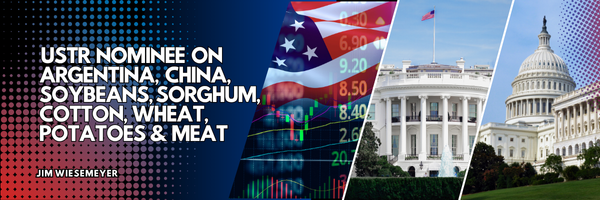
Senate Finance Panel Grills USTR Nominee on Argentina, China, Soybeans, Sorghum, Cotton, Wheat, Potatoes & Meat
Callahan defends reciprocal trade approach amid bipartisan criticism over beef imports and soybean market losses
Dr. Julie Callahan, President Trump’s nominee to serve as Chief Agricultural Negotiator at the Office of the U.S. Trade Representative, faced pointed questions from senators about the administration’s trade strategy with Argentina during a contentious Senate Finance Committee hearing on Oct. 29. The scope of the hearing provided a full view of U.S. agricultural trade priorities under the Trump administration’s reciprocal-trade framework.
Argentina and Soybean Policy in the Spotlight
Sen. Elizabeth Warren (D-Mass.) pressed Callahan to address what she called “a betrayal of the American soybean farmer,” citing U.S. financial support for Argentina while American growers face surging bankruptcies and lost market access. Callahan responded that soy remains “a top commodity” in reciprocal trade talks and that her goal, if confirmed, would be to ensure “high-quality U.S. soybeans” gain global access.
When Warren demanded she identify which country was currently supplying soybeans to China, Callahan answered: “China is purchasing Latin American soybeans… soybeans from Brazil,” noting that Beijing had resumed some U.S. purchases as of that morning.
Warren also challenged Callahan on Argentine beef imports, warning they would “devastate small ranchers” while benefiting large meatpackers. Callahan declined to give a simple yes-or-no answer, emphasizing that she remained “in close communication with U.S. cattlemen” and was negotiating “to open markets for U.S. beef” under a reciprocal framework.
Callahan indicated that the U.S. is seeking trade concessions from Argentina as part of its ongoing negotiations.
Sen. Ted Cruz (R-Tex.) and Sen. John Barrasso (R-Wyo.) both raised concerns about the administration’s plan to increase Argentine beef imports under an expanded tariff-rate quota (TRQ). Cruz said there was “unanimity in the room that we should be standing strongly with our cattle ranchers.” Barrasso pressed Callahan on the timing and size of the planned 80 000-ton TRQ increase and asked how she would ensure that “U.S. ranchers aren’t undercut by lower-standard imports.”
In response to Barrasso’s questions, she said the talks with Argentina are “ongoing” and that her goal is to “reverse the U.S. agricultural trade deficit” through agreements on reciprocal trade that would turn deficits into surpluses and “ensure that U.S. cattlemen have access to markets around the world.” This phrasing — specifically her emphasis on reciprocal trade and reversing the deficit — clearly reflects a U.S. intent to obtain concessions from Argentina in exchange for expanded access.
Broader Argentina Criticism from Democrats
Sen. Michael Bennet (D-Colo.) criticized the administration’s $20 billion currency swap line with Buenos Aires and its move to expand Argentine beef imports, saying it risked taxpayer money “propping up a country that has a history of default.” He accused the White House of “doing several favors for President Milei of Argentina” even as China buys record volumes of Argentine soybeans. Callahan defended her mandate, saying the negotiations were “ongoing” and that her focus was to “open market access to benefit U.S. farmers and ranchers,” including seeking reciprocal access for U.S. beef into Argentina.
China
Dr. Callahan was questioned by Sen. Warren about China’s “weaponization of agriculture.” She said China’s retaliatory policies had “absolutely harmed U.S. soybean farmers,” and she committed to rebuilding access to the Chinese market. She also referenced the early enforcement of the Phase One trade agreement, saying that during President Trump’s first term, USTR tracked China’s compliance weekly but that Chinese agricultural purchases have since “slid back.”
Sen. Steve Daines (R-Mont.) asked about declining beef exports to China. Callahan responded that China’s restrictions were retaliatory and that reopening the Chinese market for U.S. beef would be a priority if she is confirmed.
Dr. Callahan was asked about U.S. cotton exports within the context of China’s agricultural retaliation. Senators referenced China’s state-controlled purchases that favored African and Brazilian cotton. While not an extended exchange, Callahan affirmed that cotton remains one of the key commodities USTR is targeting for new access under reciprocal trade negotiations, citing it alongside soybeans and beef as sectors hit hard by tariff retaliation. She said her office would “press for restored cotton access in Asia and emerging markets” if confirmed.
Sorghum came up when senators discussed non-tariff barriers and Chinese import restrictions. Callahan acknowledged that U.S. sorghum exports had fallen sharply after Chinese anti-dumping and anti-subsidy actions. She said her focus was to “eliminate unjustified barriers like those China imposed on U.S. sorghum” and to seek market diversification beyond China, noting that several Southeast Asian nations were potential buyers under ongoing negotiations.
Daines devoted a significant portion of his questioning to the collapse in U.S. beef exports to China since March. Daines said that foreign competitors — notably Australia and Brazil — were “filling the void” left by reduced U.S. shipments. He asked: “Dr. Callahan, are we making any progress in reopening the China market, the second-largest beef export market in the world, or finding additional markets for U.S. beef?”
Callahan’s response: She acknowledged the sharp decline and said, “If confirmed, I am committed to reopening China’s market to U.S. beef. China’s behavior can be explained only with one word — retaliation.”
She added that during President Trump’s first term, USTR provided the White House with weekly reports on China’s compliance under the Phase One trade deal and that she intends to “reverse that trend and rebuild access to the Chinese market.”
Wheat Market Access in Japan and South Korea
Sen. Daines noted that Japan and South Korea are “staunch allies and major purchasers of Montana wheat” and emphasized that “95% of the world’s consumers live outside the United States,” underscoring the need for stronger export access. He asked whether U.S. wheat had benefited under the recent framework agreement with Japan and whether more positive outcomes could be expected with South Korea.
Dr. Callahan responded that the administration’s reciprocal trade negotiations were focused on three key areas:
• Lowering tariffs on U.S. agricultural products.
• Eliminating unjustified non-tariff barriers that restrict trade.
• Securing purchase commitments from partner countries willing to do so.
She said that U.S. wheat was one of the commodities being prioritized, noting that “a number of countries are committing — signing MOUs with the private sector, making plans to import more U.S. wheat to benefit U.S. wheat growers.”
Specifically, Callahan said that with Japan and South Korea, USTR will be pressing to remove non-tariff barriers “that are unjustifiably holding back purchases of U.S. wheat” and will work to promote further market access for those two key Asian markets
In essence, the discussion framed Japan and South Korea as cornerstone wheat markets in the administration’s Asia trade push — with Callahan pledging to deepen access through both tariff and non-tariff reforms and through private-sector purchase commitments.
Support from Republicans and Industry Concerns
Republican senators largely backed Callahan’s broader trade philosophy but sought assurances that Argentine imports would not depress domestic cattle prices. Sen. Barrasso cited ranchers’ fears of an “announcement related to Argentina” and asked how she would protect U.S. producers. Callahan replied that all current negotiations “are intended to reverse the U.S. agricultural trade deficit” and to ensure “U.S. cattlemen have access to markets around the world.” She said the Argentina beef talks remain “ongoing” and without a fixed timeline.
Barrasso also questioned her about the struggling U.S. sheep industry. Callahan said she had met with Utah producers and was “committed to ensuring that American lamb producers have a fair shake,” adding that imports were “out-competing” domestic growers and that she aimed “to see that reversed.”
Broader Meat Trade and Market Access
In her opening statement, Callahan grouped beef, pork, and poultry together when outlining her trade priorities, noting that U.S. meat exports face a mix of tariff and sanitary-phytosanitary barriers. She said she would work to:
• eliminate “unjustified restrictions on U.S. meat,”
• press for science-based import protocols, and
• expand access in markets such as Japan, South Korea, and Southeast Asia.
U.S. Lamb (Sheep Industry)
At the end of Barrasso’s questioning, he pivoted to the sheep industry, saying it had suffered from import competition. Callahan said she had met with producers in Utah and promised to ensure that “American lamb producers have a fair shake” and that she wanted “to see that reversed as well.”
Other Issues Raised
Throughout the hearing, senators touched on a range of trade concerns beyond Argentina — from China’s non-tariff barriers on beef and sorghum to expanding wheat market access in Japan and South Korea. Callahan vowed to pursue “lower tariffs, eliminate unjustified barriers, and secure purchase commitments,” highlighting that American agriculture “is second to none” but faces unfair treatment abroad.
The hearing included discussion of increasing U.S. potato exports, though not in connection with Argentina. Sen. Maria Cantwell (D-Wash.) pressed Callahan on the lack of progress in gaining market access for fresh U.S. potatoes in Japan. Callahan said she was “very personally familiar” with the issue and was “committed to resolving it with Japan.” She criticized Japan’s “unjustified non-tariff barriers” that block U.S. potatoes and pledged to work toward removing them. She also extended that commitment to specialty crops such as apples and cherries.
Sen. Cantwell also highlighted port competitiveness. She linked Japan’s non-tariff barriers to broader trade imbalances and asked how USTR would protect Northwest ports from losing traffic to Canadian harbors.


